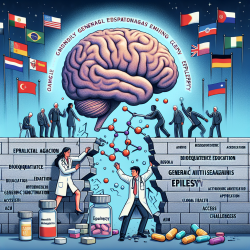As a practitioner in the field of speech-language pathology (SLP), staying updated with the latest research and integrating its outcomes into your practice is essential. One such research study, titled "Knowledge of the Roles of Speech-Language Pathologists by Students in Other Health Care Programs" by Amanda Sullivan and Patricia L. Cleave, offers invaluable insights that can help enhance interprofessional collaboration and improve service delivery.
The study surveyed 268 students in their first and final years of medicine, nursing, physiotherapy (PT), and occupational therapy (OT) programs at Dalhousie University. The findings revealed that final-year nursing, PT, and OT students were more knowledgeable about the roles of SLPs than their first-year counterparts. However, there was no significant difference between first and final-year medical students. This suggests that some healthcare programs may offer more exposure to the roles of SLPs than others.
Key Takeaways for Practitioners
- Interprofessional Education: The study underscores the importance of interprofessional education in healthcare programs. Students who attended more interprofessional modules had a better understanding of the roles of SLPs. As a practitioner, advocating for and participating in interprofessional education can enhance your collaboration with other healthcare professionals.
- Focus on Speech and Language: The study found that students were more knowledgeable about the role of SLPs in addressing speech difficulties than language difficulties, especially cognitive or social language. This highlights the need for SLPs to educate their colleagues about the full scope of their practice, including language and cognitive communication disorders.
- Clinical Experience: Clinical placements that involve interaction with SLPs can significantly enhance students' understanding of the profession. As an SLP, you can contribute to this by offering shadowing opportunities and engaging in interdisciplinary clinical settings.
Implementing the Research Outcomes
Here are some actionable steps you can take to implement the outcomes of this research:
- Advocate for Interprofessional Modules: Work with educational institutions to include interprofessional modules that focus on the roles of various healthcare professionals, including SLPs.
- Increase Visibility: Host workshops, seminars, and open houses to educate other healthcare professionals and students about the roles and responsibilities of SLPs.
- Collaborate Actively: Engage in interdisciplinary team meetings and case discussions to showcase the value that SLPs bring to patient care.
- Mentorship: Mentor students from other healthcare programs to provide them with firsthand experience of the roles and impact of SLPs.
By taking these steps, you can help bridge the knowledge gap and foster a collaborative environment that ultimately benefits patient care.
To read the original research paper, please follow this link: Knowledge of the Roles of Speech-Language Pathologists by Students in Other Health Care Programs.










